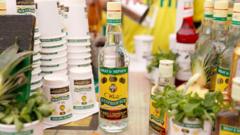The debate around what exactly qualifies as "Jamaican rum" has escalated into a significant legal and cultural dispute on the Caribbean island. This issue ignites passionate opinions, particularly as producers advocate for more stringent guidelines regarding the labeling of their rum.
In October 2022, Jamaica's Intellectual Property Office (JIPO) made pivotal amendments to the geographical indication (GI) rules for Jamaican rum, originally established in 2016. The most notable change prohibits aging rum outside of Jamaica, a ruling driven by the Spirits Pool Association (SPA). Representing six of Jamaica’s rum distilleries, including notable brands like Appleton and Hampden Estate, the SPA argues that stronger GI protections are necessary for international recognition in key markets like the EU and US.
Proponents of the amendment believe it will safeguard Jamaican rum against competitors, enhancing its status as a premium product defined by its geographic origins and production standards. However, this decision has sparked controversy, particularly from National Rums of Jamaica (NRJ), which claims the new regulations threaten its business model—NRJ controls two of Jamaica's major distilleries, Long Pond and Clarendon.
NRJ's association with the Barbados-based West Indies Rum Distillery (WIRD), now owned by French firm Maison Ferrand, has become a focal point of contention. The company insists that rum aged internationally should still be classified as Jamaican, arguing that the practice has been longstanding and integral to its business operations.
Christopher Gentles, general manager of the SPA, expresses bewilderment at NRJ's conflict with the geographic designation, emphasizing that authentic Jamaican rum should age in Jamaica to maintain its unique characteristics. The potential economic repercussions have also been cited, with the SPA pointing out that local aging benefits not only preservation but also contributes to local employment in sectors like tourism and distribution.
According to intellectual property law expert Dev Gangjee, the implications of GIs extend beyond traditional marketing—they prevent standardization and commodification while boosting regional pride. Globally, products with GIs, such as Scotch whisky and Parmesan cheese, can command higher prices due to their authenticity.
This debate isn't uniquely Jamaican; Barbados faces similar challenges, lacking an established GI, leading to disputes among local distilleries about the ownership and representation of Barbadian rum.
As Jamaica seeks to secure its GI status with the EU, the SPA hopes negotiations can yield a compromise beneficial for all parties involved. Amidst these tensions, local sentiments underscore a broader call for the protection and integrity of Jamaican rum, which is deeply woven into the island's heritage. A recent editorial from the Jamaican newspaper The Gleaner endorsed the latest ruling, arguing against the appropriation of Jamaican branding by foreign entities.
Both sides agree that the resolution of this dispute will shape the future of Jamaican rum and its reputation on the global stage, intertwining pride, economic stakes, and cultural identity in every bottle.





















